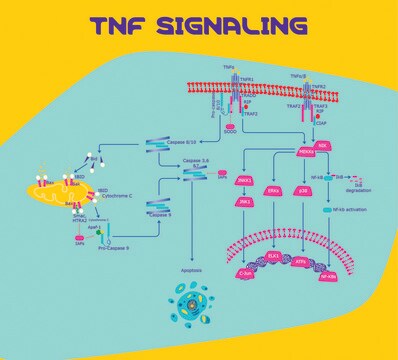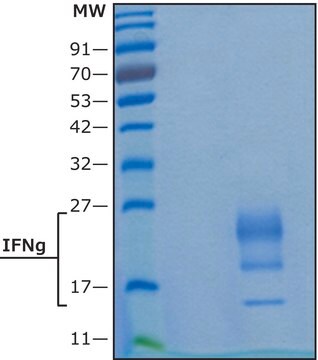I8907
Interferon β from rat
≥95%, recombinant, expressed in CHO cells, lyophilized powder, suitable for cell culture
Synonym(s):
IFN-β
Sign Into View Organizational & Contract Pricing
All Photos(1)
About This Item
Recommended Products
biological source
rat
Quality Level
recombinant
expressed in CHO cells
Assay
≥95%
form
lyophilized powder
mol wt
~20 kDa
packaging
pkg of 1 vial
concentration
≥100000 units/mL
technique(s)
cell culture | mammalian: suitable
UniProt accession no.
shipped in
dry ice
storage temp.
−70°C
Gene Information
rat ... Ifnb1(24481)
Related Categories
Biochem/physiol Actions
Interferon β belongs to the type 1 interferon family pf proteins. It is also needed for the inhibition of tumor cell growth via cell death, S-phase increase and mediating differentiation. It is also important for bone homeostasis.
Cytokine with anti-viral, anti-proliferative, immunoregulatory, and proinflammatory activities.
Physical form
Lyophilized from phosphate buffered saline (PBS) containing 125 mM trehalose.
Analysis Note
The biological activity is determined in the cytopathic effect inhibition assay using rat epithelial-like (RATEC) cells with vesicular stomatitis virus (VSV). The cytopathic effect of 50% is produced with approximately 1 unit/ml interferon. Since there is no international rat interferon β standard, units are determined with respect to the NIH international standard reference for mouse interferon α/β.
Storage Class Code
13 - Non Combustible Solids
WGK
WGK 1
Flash Point(F)
Not applicable
Flash Point(C)
Not applicable
Personal Protective Equipment
dust mask type N95 (US), Eyeshields, Gloves
Certificates of Analysis (COA)
Search for Certificates of Analysis (COA) by entering the products Lot/Batch Number. Lot and Batch Numbers can be found on a product’s label following the words ‘Lot’ or ‘Batch’.
Already Own This Product?
Find documentation for the products that you have recently purchased in the Document Library.
C Ren et al.
Gene therapy, 15(21), 1446-1453 (2008-07-04)
Cell-based therapy for cancer is a promising new field. Among cell types that can be used for this purpose, mesenchymal stem cells (MSCs) appear to hold great advantage for reasons including easier propagation in culture, possible genetic modification to express
R B Pepinsky et al.
The Journal of pharmacology and experimental therapeutics, 297(3), 1059-1066 (2001-05-18)
Interferon therapies suffer from a relatively short half-life of the products in circulation. To address this issue we investigated the effects of polyethylene glycol modification (PEGylation) on the pharmacokinetic properties of human interferon (IFN)-beta-1a. PEGylation with a linear 20-kDa PEG
J Adriaansen et al.
Human gene therapy, 17(10), 985-996 (2006-09-21)
Interferon (IFN)-beta has significant immunomodulatory properties and has received much interest as a potentially therapeutic agent for rheumatoid arthritis (RA). Systemic IFN-beta treatment of patients with RA was not effective, probably because of pharmacokinetic issues. Therefore, we studied the effect
Junqiang Ye et al.
PloS one, 6(6), e20681-e20681 (2011-06-17)
The production of type I interferons (IFNs) in response to viral infections is critical for antiviral immunity. However, IFN production is transient, and continued expression can lead to inflammatory or autoimmune diseases. Thus, understanding the mechanisms underlying the negative regulation
Interferon standards and general abbreviations.
S Pestka
Methods in enzymology, 119, 14-23 (1986-01-01)
Our team of scientists has experience in all areas of research including Life Science, Material Science, Chemical Synthesis, Chromatography, Analytical and many others.
Contact Technical Service


